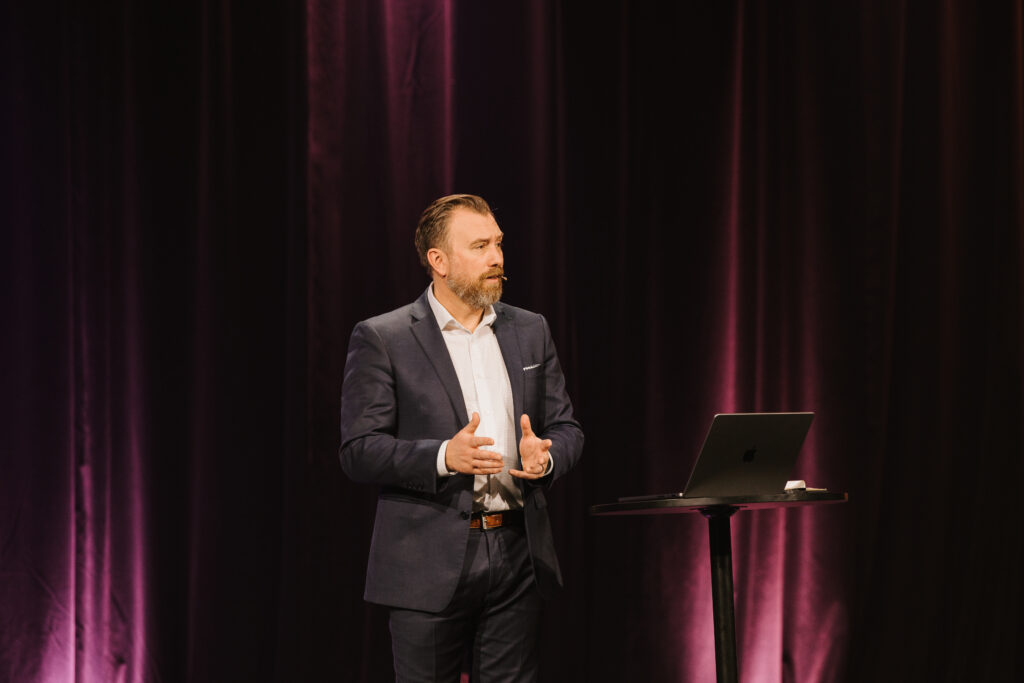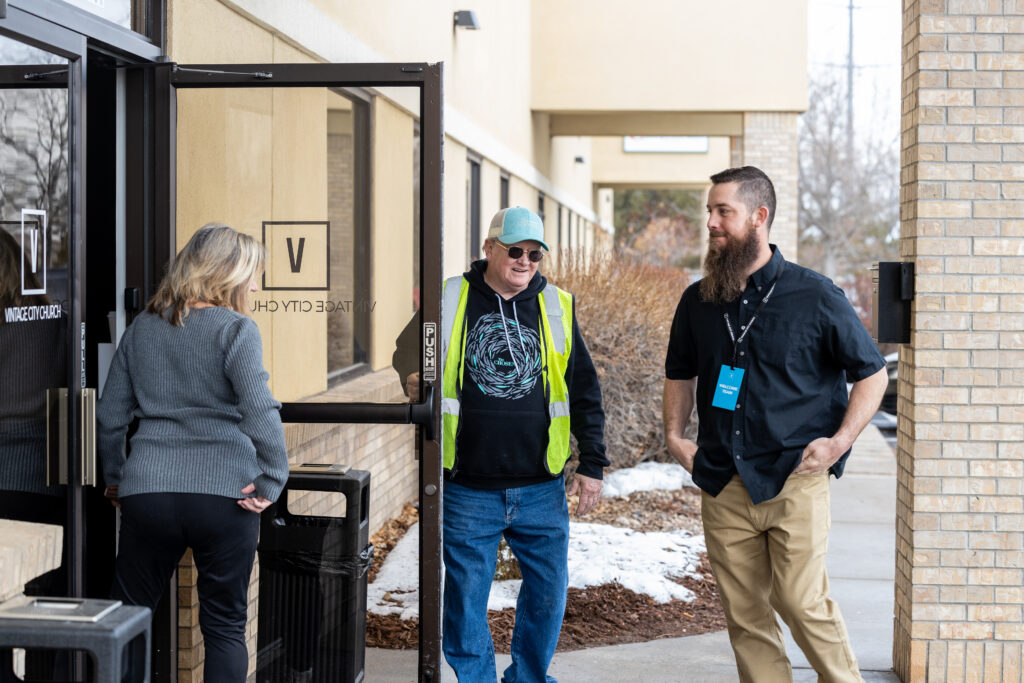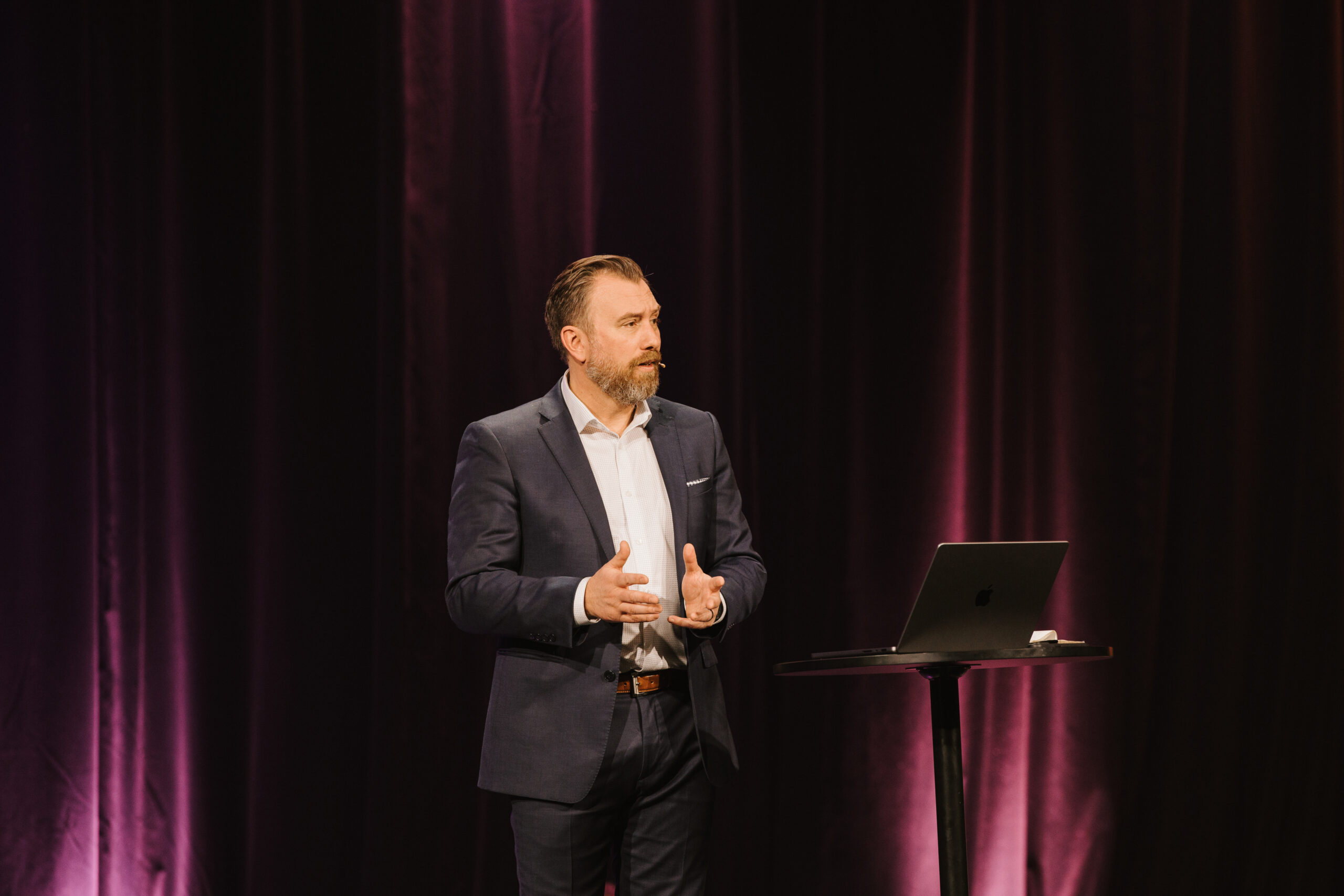Engaging with others opens relational doorways for supernatural transformation. You are never going to imprint somebody in the supernatural if you don’t engage them.
February 9, 2023





Speaker: Pastor Greg Sanders
Passage: Romans 12:15-21
Contributing To The Peace Process
Last week, Pastor Dustin shared with us this incredible challenge from Paul’s teaching about living in peace. Maybe a better way to say it is owning our investment in the world and, to that end, really being a people that are very acutely aware of what we’re contributing to the peace process around us.
How many, like me, found yourselves challenged by that this week? What am I contributing to the peace process?
I love that phrase where Paul says, “As much as it is unto you, live at peace.” In other words, you make sure everything that comes out of you is peaceful.
Romans 12:15
I want to pick this back up in verse 15 and try to move along with the same teaching. We began this in December with Romans 12:9 where he says, “Don’t just pretend to love others. Really love them.”
And Paul is, in essence, just building his case, and he’s focusing on what that looks like. Because it’d be easy to say, “Hey, don’t just pretend you love others, really love them,” like, oh yeah, cool, what a reminder, and then forget about all the micro places that we tend to do that.
But Paul’s not going to let us do that.
So in verse 15, he says this: When others are happy, be happy with them. If they are sad, share their sorrow. Live in harmony with each other. Don’t try to act important, but enjoy the company of ordinary people. And don’t think you know it all.
How many just needed to hear that? No commentary is necessary — just don’t think you know it all.
“Don’t try to act important. Enjoy the company of ordinary people. Don’t think you know it all. Never pay back evil for evil to anyone. Do things in such a way that everyone can see you are honorable. Do your part to live in peace with everyone. As much as possible, dear friends, never avenge yourselves, leave that to God.”
Now, that pause I put there is not in the text. It doesn’t say, “As much as possible, don’t avenge yourselves.” His “as much as possible” statement is about living at peace. His statement, “Don’t avenge yourself,” is very clear. Don’t avenge yourself. Leave that to God.
“For it is written, ‘I will take vengeance, I will repay those who deserve it,’ says the Lord. Instead, do what the Scriptures say. If your enemies are hungry, feed them. If they’re thirsty, give them something to drink. And they will be ashamed of what they’ve done to you. Do not let evil get the best of you. But conquer evil by doing good.
Holy Spirit, as we step into this, you are the guide. You are the teacher. We’re going to do our best to discern what the text says. But we need you to illuminate, bring clarity, and reveal things. At the end of the day, I want us to be a people that could follow you a little bit better and have a greater understanding of what it looks like to live this out. So we asked you for your wisdom and your guidance. Everybody said, Amen.
Living In Harmony With Each Other
All right. Let’s pick up with verse 15.
“When others are happy, be happy with them. If they’re sad, share in their sorrow, live in harmony with each other.”
Is there anybody besides me who has noticed a tendency in themselves to hate on everybody’s happiness when they’re happy around you? Like, you find it tough to really come alongside of them because instantly you feel a little bit of judgment of, like, “I’m kind of irritated that they’re happy.” Or maybe when they’re sad, it’s the opposite. You just don’t care.
How many will be honest enough to say, “Once or twice in my life, I have faked that I cared when somebody was sad?” Right. I can’t believe I just said that in church. My hand was up.
But Paul makes a statement here that I think would be easy for us to miss. His statement is that we are to join others in their emotions. When they are happy, be happy with them. The word means to be full of cheer. It is the idea of matching or mirroring and coming alongside what’s going on. When they’re sad, be sad with them. The word is literally rendered as “sob with them.” It’s this incredible idea of having a sympathetic response. When you’re with someone, there’s enough empathy coming out of you that you could join them in their condition.
When I read that, the first thing that comes to mind is, “That’s going to be a lot of work.”
Because it’s easier not to care. It’s easier to kind of push that off into the realm of, “You know, you got problems, sorry.” Or, “Hey, great, glad it’s going well for you,” or “Great, life’s good. Mine’s not.” And to not engage.
But Paul’s statement here isn’t to just recognize our emotions, which I think many of us would do. We would recognize, “Hey, it’s great that you’re happy. I’m happy for you!” Or “I’m sorry you’re sad. That’s a bummer.” And we recognize the emotion. That’s not what Paul says at all.
What Paul says here is that we are to join them in their season. And what he’s calling you and me to do as believers is to choose to actually and really engage other people.
The Crux Of The Cross Message
Something very simple became very difficult all of a sudden. To live as a people who will actually engage with others around us is to really join them in what they’re going through. But if we think about what Jesus did, isn’t that kind of the crux of the cross message? That he chose to join with humanity. He chose to become as we were, set his godliness aside, to become human.
We celebrate it at Christmas all the time. We call him Immanuel.
What’s Immanuel mean? “God with us.” Not “God alongside of us.” Not “God near us,” but “God with us.” And what Paul’s calling the church to do is to mirror that same idea.
I would say it this way. Engaging with others opens relational doorways for supernatural transformation. You are never going to imprint somebody in the supernatural if you don’t engage them. And most people only care what you know once they know how much you care. Jesus models that, but we so easily strip it away from our culture because it’s hard. And it’s really not that much fun to have to engage and be involved. It’s so much easier to step away and live from a distance.
But we could consider that our tendency to distance ourselves or refuse to join in others is rooted not in our kingdom nature but in our sin nature. Scriptures would say it this way, a recluse — what’s a recluse? A loner, isolated, someone who pulls away and precludes. Scriptures would say a recluse is self-indulgent. That at the root of this lack of engagement is selfishness.
Engaging In Kingdom Discipline
That’s a bummer because I’m a loner. I have a better term for it; I call it an introvert.
But the truth is, Paul’s statement here has nothing to do with the temperament you were born with. He’s talking about a kingdom discipline. Engaging with others is the kingdom response.
Perhaps if you’re like me, and you’re like, “Really? You’re an introvert?”
I’m a total introvert. So happy alone. Like, I picked one human being that I really wanted to hang out with, and I was good after that. That’s my core wiring. And then Jesus thought it was funny to invite me to be a pastor.
So my life has been spent learning how to live this reality of engaging with others, never letting exist in me that natural DNA of “It’s really not my problem that you got problems.” Paul’s invitation to us is to be people like that.
The Antidote To Our Sin Nature
What happens if learning to engage like this is actually the antidote to our sin nature? That by choosing this discipline, it helps us begin to transform into His image. Because Paul doesn’t lay it out as a suggestion. Some of you that are really good with people and really like people. I want you to love them well. I want you to engage them.
I think it would have made more sense if he said, “Those of you that have empathy go be with people. Those of you that don’t, just be quiet.” But that’s not his call at all. His call is to be the body of Christ.
The Holy Spirit’s Challenge
If our sin nature leads us to ignore others in their situation and maybe chalk it up to “Hey, that’s their stuff,” then maybe the kingdom reciprocal leads us to genuinely love others by joining them in their seasons. And here’s my question: who in your life comes to mind where you’re like, “Man, I need to really engage, and I’ve been choosing not to engage because it’s messy.”
Those are the places the Holy Spirit’s challenging us to change. I think sometimes the deeper truth is that we don’t engage because we don’t believe our investment in them matters.
Church, I want to challenge you to see yourself the way he sees you. Your strength, the camaraderie you bring, and the comfort you can bring can change people’s lives around you. You have something to give to shape the world. And that’s what Paul’s dealing with.
Do not ever accept the lie from the enemy that says your investment won’t matter. You have a king who is madly in love with you and believes that every person you will engage with and touch, you will change. And what he knows is that “Greater is he in you than he who is in the world.” And if he can get you into people’s lives, connect to them, and begin conversations with them, He can start downloading prophetic information, and you can begin to be a resource of heaven to that person. And sometimes we don’t experience that because we don’t engage.
Some of you are like, “I’m not compassionate.” And the truth is, you might be deeply compassionate. You might actually be so compassionate, you’re scared of it so you never turn it on. But the world around you needs that compassion.
We learn more about who we are, who he is, and how he loves when we’re willing to step into this kingdom idea of engaging with other people.
Aligning With The Mindset Of Others
Paul adds the phrase, “Live in harmony with each other.” And it’s easy to glaze past because the root word harmony here means “sameness.” It doesn’t say, “Live the same as everyone around you.” Because this same Paul will say, “Come out of the world, be separate, don’t obey the manners and customs of the world around you.” So that’s not what he’s talking about. This word actually means “congruency and consistency of thought.”
To explain it more clearly, in the Greek, it speaks directly to a mindset. It’s a mental orientation. We are to be in a condition of working to fit or align with the mindsets of others, not requiring others to fit or align with our mindset.
How many have ever gone fishing? Do you realize in the act of fishing, you are fitting and aligning with the mindset of a fish? How many of you want to jump in the water and eat worms off of a hook? How many of you have ever thought fish eggs were appetizing to jump into the stream? Take a swim, eat a couple of fish eggs. How many of you’ve ever chased bugs through the water to eat them? No. But you understand that fish like that. It’s what attracts them.
What Paul’s dealing with here is learning how to make it easy for people to want to be around us because we fit to them, not ask them to fit to us.
And the church at large needs to figure this one out. For the last three years, we have demanded of the world around us that they either agree with us, fit with us, and align with us or we separate instead of saying, “It’s incumbent upon me to fit or align with you because I’ve been called to live in harmony towards you, not asked you to live in harmony towards me.”
Some of us have walked away from marriages because “My spouse doesn’t fit or align with me.” This is sin, and it has to stop because the call of God on us says that we choose to fit and align.
Well, what about them? Jesus doesn’t give any provision for them — only us.
As far as it is unto you, live at peace. Own it. Own the terra firma you stand on for peace and for harmony. And just say it this way, “My job is harmony.” But what about them — I don’t care. Because if you do your job, it won’t matter. If you could live in this way, and if we could live in this way to say, “I’m going to force myself to become harmony to what’s around me,” guess what has to happen for that? We’ve got to let go of many things we care about and say, “Look, I’m here with an agenda. I actually want to stay close to you because you belong to me in the kingdom. And I believe that my impact on you matters. So I’m going to put up with a bunch of stupid to stay close.”
Controlling Our Minds Toward Others
If we consider Paul’s language here, this idea of harmony seems to begin with the idea of learning to control our minds toward others. I would submit that you can’t be in offense towards someone if you’re working to live in harmony toward someone. I would also submit that if there’s an offense in your heart toward someone, you have left working for harmony. Because what you said is, “This thing, this action, this behavior, this moment now is more important to me than the call of God to be in harmony with you.”
I hate Romans 12 for so many reasons. Because it makes zero allowance for my nature. It almost feels like everything Paul’s espousing requires a flip or a counter to who I am natively. Maybe you’re better than that natively. I am not.
But this idea here says it’s on you and me to decide to fit with people. We’re not saying to the world around us figure out how to fit with me. I know we have opinions. And I know we have perspectives; I’m just not so sure they matter. If you’re holding an opinion and a perspective that gives you the right to be separate from someone in the kingdom, it’s sin, period. That’s a tough line.
Be A People That Fights For Harmony
What does it mean to actually work to find a way to be congruent with others? Because Paul’s statement here is that the word “others” means “everyone.” And I want us to be clear with this. He’s not saying living in harmony with most people is okay and having a bunch you don’t care about is okay. Instead, we are to be people fighting for harmony, demanding it of ourselves, not the world around us. I don’t know about you, but I’m great at demanding it around me — not so great at demanding it of me.
I think Paul’s calling is that we engage people around us because we understand who they are to him. We understand their unique value to him, so we will treat them the way he’s treated us. Isn’t that how he treats us? When did he ever demand that we got our thinking right so he would talk to us? When did he ever demand that we fix our habits so he could deal with us?
Being Enveloped With God’s Love
The truth of Scripture is that he loves us, moves toward us, and envelops us before we love him. And he paves the way. What happens, church, if by mirroring that reality, he’s teaching us how to make all these bridges through this society that we live in? That we’ve learned how to love people before they deserved it — even when they didn’t deserve it — but we love them as a precursory movement to say, “I’m going to love you, I’m gonna be this way towards you, so that when you wake up to your senses, there’s an easy road to come back.”
Living In Harmony Is Not Natural
This living of harmony is not natural. It’s a kingdom choice we have to make through the Holy Spirit, and it’s a kingdom choice we have to make every single day — probably about 700 times a day.
I would also suggest that our enemy distorts the mind and uses our own perception against us. He’s currently, at this moment, disrupting the movements and the work of the Lord with this tactic. And I think a large part is because the people of God have made it easy for him to use this against them. When we fail to walk in this discipline, we make it easy for the enemy to undermine what the Lord is trying to do.
And so, instead of seeing cities transformed by the supernatural message of Jesus, we see cities that are just repeating the same cycle of brokenness and fissure between the people of God because they will not discipline themselves to live with this mindset of sameness and harmony.
And we feel deeply justified to have these perspectives. And the truth is, biblically, we’re not. The church at large spends more time focusing on where they’re not congruent instead of working to find congruence. It’s hurting what the Lord’s trying to do in our day and in our time.
I only get the privilege of speaking to this house. But my statement to this house is this.
“Our hearts and our minds are for the region. They’re not just for this house. We’re going to become a people that would live it and model it and make space for other friends that are in the kingdom that might not get it yet. It’s okay. We’re just going to ensure we don’t set a bad example. We’re going to take seriously this message of as much as it is unto us, we’re going to do everything to live at peace.”
That’s a big word. And I’m out of time.
I know this is a tougher message with a little more teeth to it. Please hear my heart. We’ve got to take seriously what it looks like to live the kingdom. And not just in the praying for people, not just in the believing for the prophetic. We have to be a people who will take seriously what it looks like to live the micro-moments of the kingdom, the interpersonal things, the details of what it looks like to really walk in love. Because the Scripture doesn’t say the world knows us by our prophetic voice. It says the world knows we’re real by the way we love.
Building A Foundation Of Love
I deeply want the prophetic released in this house. I love watching the Lord do stuff. I also deeply believe that the prophetic and the grace of transformation and the supernatural revival we’re hungry for will never be released on people who don’t walk in love. Love becomes the precursory movement we make to say, “Here, oh Lord, have I prepared a place for you to dwell. I’ve worked on this thing, so you can rest on it.”
The Holy Spirit cares a lot more about Monday through Saturday than we think he does. He cares about who we are at work. He cares about how we handle our kids and our spouses. He cares about all this stuff, because all of them are signals to him. “My mind is on you. I’m preparing a place for you to dwell constantly. With every micro-moment I’m declaring with my life ‘Come rest on me. Come rest on me. Come rest on me.'”
And we’re not going to walk perfectly. I’m not saying that. We have to be people that are broken by our own mistakes. Enough that we, in the moment, would stop and say, “Oh, I was such a poor representation of my king. Will you please forgive me? Lord, would you please forgive me? I want this life to carry your presence. I don’t ever want you to feel foreign in this house.”
Paul’s teaching here is about being a people that look like Jesus, not just say they belong to Jesus. This is not going to be tested right now. This gets tested at home. It gets tested at work.
I’m asking you to sit with the Lord and make space for him to speak to these areas. Go sit and ask, “Lord, we looked at the scriptures today. Will you search my heart? Will you show me what you want from me?”
We love you, Jesus. We love your Scripture. Lord, we feel the weight of this incredible call not just to be transformed from our sin but to be transformed into your image. So we make space for you to do that. Lead us and guide us. May your face shine upon us. I pray that even in our homes today, we just be really tender with each other. Treat each other like we just went through surgery because we did. We love you and we honor you, amen.
Leave a Reply Cancel reply
the vintage weekly
News, updates, and events sent directly to your inbox every Thursday morning.
Stay up to date with what is going on at Vintage by subscribing to the Vintage Weekly - our weekly newsletter - and downloading the Church Center app. These resources enable us to keep you updated of upcoming events, opportunities, and alerts such as weather cancellations.
SUBSCRIBE TO VINTAGE WEEKLY
DOWNLOAD CHURCH CENTER APP
©2024 vintage city church All Rights Reserved
designed BY Amanda Doherty press, llc
back to top
get the news
Subscribe to the Newsletter
About
Statement of Faith
Our Team
Photo & Video Policy
Prayer Request
Capture Your Miracle
Find us
1501 Academy Court, #101
Fort Collins, CO 80524
970-779-7086
info@vintagecitychurch.com
Thank you for submitting your message. We will be in touch shortly.
